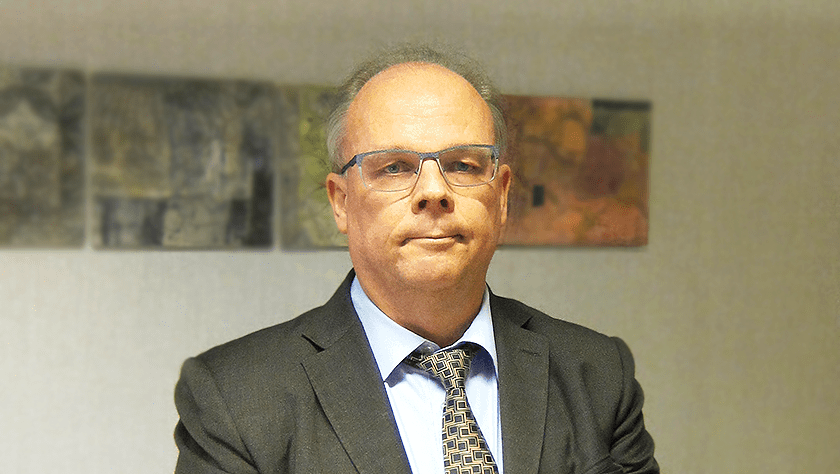21Mar2016
With the eyes of the world transfixed on Syria, one could think Mr. Harri Mäki-Reinikka, Finland’s former ambassador to Syria and current extraordinary and plenipotentiary ambassador to Lithuania, now stands on a much less eventful territory. Although the serene and laid-back Lithuanian capital of Vilnius could offer the seasoned diplomat a well-earned rest after his stint in Damascus, out of which he also oversaw affairs in Iraq, Lebanon, and Jordan, Mäki-Reinikka softens the assumption. “Vilnius is a very happening place. Finland can look up to Lithuania’s ability to expand export markets amid the geopolitical tensions to where Finns have got a scarcer presence,” says the ambassador.
Nordic Business Report: Vilnius must have been a harbor of solace for you…
Harri Mäki-Reinikka: I have three years in Lithuania under my belt now, and I will return to Helsinki most likely in the autumn. It’s been a lot of work here too, but the environment in Vilnius is surely incomparably safer and described as normal among diplomats. In Syria there was a war and, unfortunately, it is continuing.
NBR: Speaking of Lithuanian and Finnish businesses, there are obviously more similarities than differences. Could you give us examples of the differences?
H M-R: Because both countries are EU members, there are certainly a lot more similarities than differences, and the differences in my eyes arise from the unique histories of the two countries. The market economy in Finland has been continuing for over a century now, and it is only into its third decade in Lithuania. Those almost 26 years as an independent state have not been enough for Lithuania to root out all its unnecessary bureaucracy, shadow economy and, I am sorry to say, corruption.
But that said, I also must praise Lithuania’s economy for the huge development and advancement it has seen. Especially during the recent years. Talking about the above-mentioned scourges, both the Lithuanian government and president do much to eradicate them.
Speaking of corruption, Finland stands second in the global corruption index, but it does not mean that the Finns would not have to deal with corruption.
As a matter of fact, Lithuania has managed to substantially curtail bureaucracy over the last few years: issues are being solved more efficiently and transparently, and the Finnish companies in Lithuania are not complaining the way they did when I first came here three years ago.
NBR: In your opinion, what sectors are the most plagued by bureaucracy and corruption?
H M-R: As I said, things have improved quite notably lately, although Lithuania’s energy sector seems to be prone to bureaucracy. My observations on bureaucracy and corruption come from general observations, the meetings I’ve had in Vilnius as the ambassador, as well as other international sources.
NBR: What are the most common observations that Finnish companies share with you about operating in Lithuania?
H M-R: I’ve mostly heard positive stories from the Finnish companies. However, I would say that one of the most talked about subjects is the Lithuanian taxation system. Finland has a different approach to it. Finland has a progressive taxation system, which for many seems to be a very good thing. But if you were to speak to the heads of small and medium-size Finnish companies, most will most likely insist that the tax system in Estonia, Latvia and Lithuania is better. I believe this is one of the reasons why so many Finnish companies do business in the region, especially in Estonia. In Lithuania, we have 170 Finnish companies, an obvious indicator that investors find the local business environment attractive.
The volume of trade between the two countries has been on the rise: it grew sixty percent three years ago and around forty percent two years ago. We still need to see last year’s statistics, but it looks like growth has been stable. In Lithuania’s trade volume standings, Finland is placed sixteenth or seventeenth, but when it comes to investments in Lithuania, Finland is firmly sixth or seventh among the other countries. Very interestingly, as an investor, Finland is at the top of job creation in Lithuania. Around 12,000 new vacancies have been created by Finnish companies, a significant contribution to the Lithuanian economy.
NBR: Finland is still a lot more present in Estonia than in Latvia and Lithuania. Is that just a matter of proximity?
H M-R: Indeed. Although I am not aware of the precise numbers, the Finnish presence in Estonia is many times bigger than it is in Lithuania or Latvia. I sometimes make a joke that there is such a huge difference like if there was an imaginary wall between Estonia and the other two Baltic states. Statistically, every fifth Finn visits Estonia every year, i.e. around one million Finns. But the figurative wall I mentioned is slowly falling. This is happening in part because of the Rail Baltica project as well as the improvements in flight connections between Helsinki and Vilnius.
I also still see few untapped business opportunities that Lithuania can offer. For example the port of Klaipeda on the Baltic coast; once Finnish companies discover its capacities and possibilities as a cargo transit route to the east, we might well see quite different dynamics in our mutual trade.
As Ukraine is gradually turning into the 21st century’s new “Great Silk Road” – a transport passage between the European Union and China, providing access to the Black Sea and the Middle East – there are again new options opening up. As the Finnish trade with Russia has shrunk from 15 to 5 percent over the last couple of years, the new route to the east through Klaipeda and Lithuania can become very attractive.
NBR: Lithuania’s labor force is said to be diverse, skilled and competitive. What do you think Lithuania should do to make it even more competitive globally?
H M-R: Lithuania has a lot of young and talented people in the IT sector. The fact that over 50 international companies have set up so-called shared service centers in Lithuania supports my statement. Among those 50, there are two or three companies from Finland.
I’d say again that Finland’s advantage internationally is its longer history with the market economy and whatever stems from it. Such global companies as Nokia have not only boosted the brand of Finland as a country but have also once driven the growth and increased the capabilities of other Finnish businesses. Lithuania does not have the kind of companies that would have had the same impact. Although the Nokia we knew ten years ago is gone now, but the ramifications it has had on other businesses are vast. Nokia has produced multiple spin-offs and thousands of new start-ups.
Economically, Lithuania has achieved a lot and often has outdone its neighbors with considerably longer histories with the market economy. For example, the Lithuanian dairy sector has been very swift amid current geopolitical tensions to spot new markets in the Middle East and Asia. Some of them are barely tapped by Finland. Being almost half the size of Finland, and with a relatively modest experience of legislature, Lithuania adopts and amends legislation faster than we do in Finland.
Another thing that comes to mind is that Lithuania ought to be more supportive of its young generation to stave off large-scale emigration.
NBR: How long do you believe it will take for Lithuania to catch up with the same standard of living that the Finns have?
H M-R: I have given a lot of thought to that on many occasions. I see it from this perspective: Finland’s economy has been quite stagnant since the crisis of 2008-2009, with its GDP growth hovering around zero percent. Although Lithuania was badly affected by the economic downturn, it has managed to secure stable annual GDP growth. At 2.5% – 3.5%, it is above the European average. So, if Lithuania keeps up its GDP growth and Finland continues to lag, the Lithuanians should catch up the Finns in 25 years from now. That is my personal assessment, though.
NBR: How do the prices in Vilnius malls and supermarkets compare to those in Helsinki?
H M-R: Like me, all my colleagues and friends who come to visit me from Finland find local prices very cheap. I’d say they’re three times lower here than in most Helsinki shops. For example, I have bought a pair of very high quality, Lithuania-made, leather gloves for the winter for a price that is perhaps three times lower than you’d expect to find in a Finnish mall. And some of the services, especially those related to beauty and spa, are relatively even cheaper. Although the respective prices in Estonia are higher than in Lithuania, many Finns still choose Tallinn over Vilnius in search of cheaper shopping and services.
NBR: Statistically, around 65-70% of Lithuanian pensioners survive on a monthly pension of €220-240. Would a Finn be able to survive on such a sum?
H M-R: No. I am, of course, aware of the situation among Lithuanian pensioners. Because the minimum wage is around €350 euros and the average wage around €550 euros, purchasing power in Lithuania is far behind what people have in Finland. But I am convinced that the situation is changing for the better in Lithuania.
NBR: What are your favorite Lithuanian foods?
H M-R: It’s a hard question for me, as I have many favorite foods that I really enjoy here. What I probably like the most is Lithuanian cheese; there are so many different kinds! I’d say that all Lithuanian dairy products are great. To me, Lithuania, like Finland, is also a country of bread, which is very different and tasty here. I am especially fond of dark bread. However, I am not a big fan of the traditional Lithuanian dish, cepelinai (consisting of minced meat coated in grated potato layers). If I eat them, I develop a craving for beer. Lithuanian beer is very good, too.
NBR: Which Lithuanian goods have made their way into Finnish supermarkets?
H M-R: Honestly, I can’t come up with any specific brands. But it is not so much the “fault” of Lithuanian producers, as we Finns are not too curious about the labels of products on the shelves. Lithuanian textiles, furniture, and leather clothing have their buyers in Finland. The quality of Lithuanian commodities is high; they just need more promotion. Proper branding is very important, and I think this is where Finland outdoes Lithuania.
NBR: Have you had many opportunities to leave Vilnius and see the rest of the country?
H M-R: I have not traveled too much while here. I wish I were able to leave my Vilnius office more often. During my time in Lithuania, I’ve participated in municipal events in Kaunas (the second-largest city in Lithuania), Klaipeda, Kupiskis, Trakai, Marijampole, Druskininkai and some small settlements like Ploksciai. I still have some time left, so I hope I will be able to do more sightseeing outside the capital.
NBR: How stark do you find the contrast in infrastructure between the Lithuanian capital and the provinces?
H M-R: They are, indeed, big. EU’s financial support is mostly channeled into Vilnius, the capital city, and much less to the provinces. I am not in a position to give any advice on the issue, but the resources ought to be distributed more evenly. Similarly, the rural areas of Finland are also often underfunded, so the situation in Lithuania is familiar to me.
I think a considerably larger proportion of available EU funds have to be allotted to the provinces throughout the Eastern Europe, not just in Lithuania. Cross-border cooperation, between Lithuania and Belarus, Lithuania and the Russian exclave of Kaliningrad, and Finland and Russia, has to be stepped up, as the border areas on the EU side often suffer from underfunding and lack of attention.
NBR: Speaking of politics, how dangerous do you believe Russia to be to the Baltics and Finland?
H M-R: In Finland, we do not see Russia as a threat. It can potentially become a threat, but it is not now. In Finland, however, we are extremely worried about the situation in Russia.
Finland has condemned the annexation of the Crimea and the bloodshed in Eastern Ukraine. Needless to say, we are worried about the ailing Russian economy and the territorial violations in the air and the Baltic Sea.
The worries that the Baltic States have about Russia are very understandable to me because of the history. Although Finland is not a NATO member state, we have strongly supported Lithuania’s NATO aspirations, as we believe that the Baltic States’ NATO alliance has ramped up Finland’s security too.


